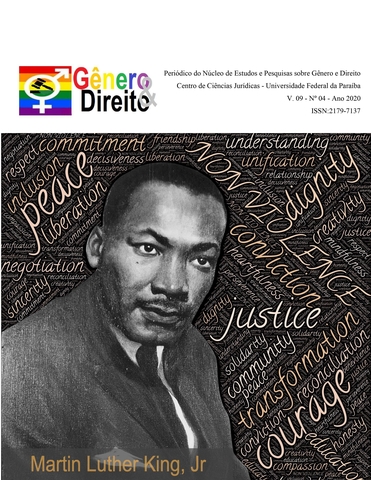CATEGORIAL FEATURES OF POLITICAL VS. RELIGIOUS DISCOURSES:
LINGUO-SEMIOTIC ANALYSIS
DOI:
https://doi.org/10.22478/ufpb.2179-7137.2020v9n04.52820Palavras-chave:
political discourse, religious discourse, socio-and linguocultural constants, linguocultural signs.Resumo
The article offers a comparative description of iconic constituents of religious and political discourses as the most complex and symbolically saturated types of institutional interaction. The research is based on a systemic multi-level analysis of the component structure of discourse in order to identify and characterize linguistic and sociocultural constants and markers of semasiologically holistic polycode practices combined by certain axiological attitudes. The methodological concept aimed at modeling institutional interactions made it possible to characterize the methods and mechanisms of explication and transformation of the iconic elements of political/religious communication, which determine algorithms of verbal-discursive behavior. The combination of methods of discourse analysis, linguistic-cognitive projection and functional-pragmatic consideration of textual units of the mentioned spheres of communication made it possible to qualify and taxonomize the linguosemiotic components of discourse data, which, while receiving a specific refraction in a socio-communicative reality, clearly demonstrate the typological signs of a linguocultural universe. The results of the study indicate that, despite the conceptual contrast between politics and religion, these types of discursive practices have many correlating features, which are based on a comparable similarity of content, mechanisms and methods of generating discursive constructs, correlated principles of representation of mental categories and a definite analogy of symbolic-symbolic design of a communication process.
Downloads
Referências
Bobyreva E.V. Religious discourse: values, genres, strategies (based on the material of Orthodox dogma): Author’s abstract, Volgograd, 2007. 43 р.
Bozhenkova N.A., Atanova D.V. Verbal ways to reflect the linguocultural traditions of society (on the material of the Russian, English and German languages) // SWSU. Part 2. 2012. № 5 (44). Pp. 269-274.
Bozhenkova R.K., Atanova D.V. Constitutive signs of religious discourse (on the material of Orthodox dogma) // SWSU. No. 2 (47). Kursk: SWSU, 2013. Pp. 205-212.
Bozhenkova R.K., Bozhenkova N.A. Some Thoughts on the Nature of the Linguistic and Cultural Consciousness of a Language Personality // Current Issues in the Study and Teaching of Russian Language and Culture: International Forum on Research, Theories, and Best Practices. USA, Washington, D.S. 2007. Pp. 43-48.
Dijk, T.A., Discourse and power: representation of dominance in language and communication. Translated from English. M .: Librokom, 2013. 344 p.
Karasik V.I. On the types of discourse // Language personality: institutional and personal discourse: Collection of research papers. Volgograd: Peremena, 2000. Pp. 5-20.
Karasik V.I. Language circle: personality, concepts, discourse: monograph. Volgograd: Peremena, 2002. 477 p.
Kibrik A.A. Modus, genre and other parameters of the classification of discourses // Linguistics studies. № 2. Pp. 3-21.
Kozhemyakin E.A. Discourse analysis as an interdisciplinary methodology: a historical aspect // Scientific bulletin of Belgorod State University. 2008. № 15 (55). Pp.5-12.
Maroshi V.V. What is discourse? [Electronic resource] Access mode: http://old.nsu.ru/education/virtual/discourse2_27.htm (date of access 08/15/2018).
Ricoeur P. Conflict of interpretations. Essays on hermeneutics. M .: Kanon-Press-c, 2002. 629 p.
Rusakova O.F., Rusakov V.M. PR Discourse: Theoretical and Methodological Analysis. Ekaterinburg: Institute of Philosophy and Law, Institute of International Relations, 2008. 282 p.
Sedov K.F. Discourse and personality: the evolution of communicative competence. M .: Labyrinth, 2004. 320 p.
Silantyev I.V. Newspaper and novel: discourse rhetoric blend. [Electronic resource] Access mode: http: //www.plam.ru/literat/gazeta_i_roman ritorika_ diskursnyh_smeshenii / index.php (date of access: 08/15/2018).
Modern Discourse Theories: Multidisciplinary Analysis (“Discourse studies” series). Issue 1. Ekaterinburg, 2006. 177 p.
Филлипс Л.Дж., Йоргенсен М.В. Дискурс-анализ. Теория и метод / Пер. с англ. 2-е изд., испр. Харьков: Изд-во «Гуманитарный центр», 2008. 352 с. Phillips L.J., Jorgensen M.V. Discourse analysis. Theory and method / Translated from English, 2nd ed., Kharkov: “Humanitarian Center” publishing house, 2008. 352 p.
Foucault M. Archeology of knowledge: Translated from French / Edited by Br. Levchenko. Kiev: Nika-Center, 1996. 208 p.
Chudinov A.P. Political linguistics: Textbook, 2nd ed., M., 2007.
Chumakova K. Religious discourse in mass media [Electronic resource]. Access mode: http://discourseanalysis.org/ada6/st47.shtml (date of access: 08/15/2018).
Sheigal E.I. Semiotics of political discourse. Volgograd, 2000. 326 p.
Bozhenkova R.K. Comprehension of text in the aspect of linguistics and culturology / R.K. Bozhenkova. Raleigh, North Carolina, USA: Lulu Press, 2015. 153 p.
Östman J., Virtanen T. Discourse Analysis. Handbook of Pragmatics, Manual. John Benjamins Publishing Company. Amsterdam & Philadelphia. 1995. Pp. 239-253.
Thompson J. Studies in the Theory of Ideology. Cambridge: Polity Press. 1984. 356 p.
Winch Р. The idea of a social science and its relation to philosophy. Sekond Edition/ London: Routledge & Kegan Paul, 1990.160p.
Wodak R. Disorders in Discourse. London: Longman, 1996

